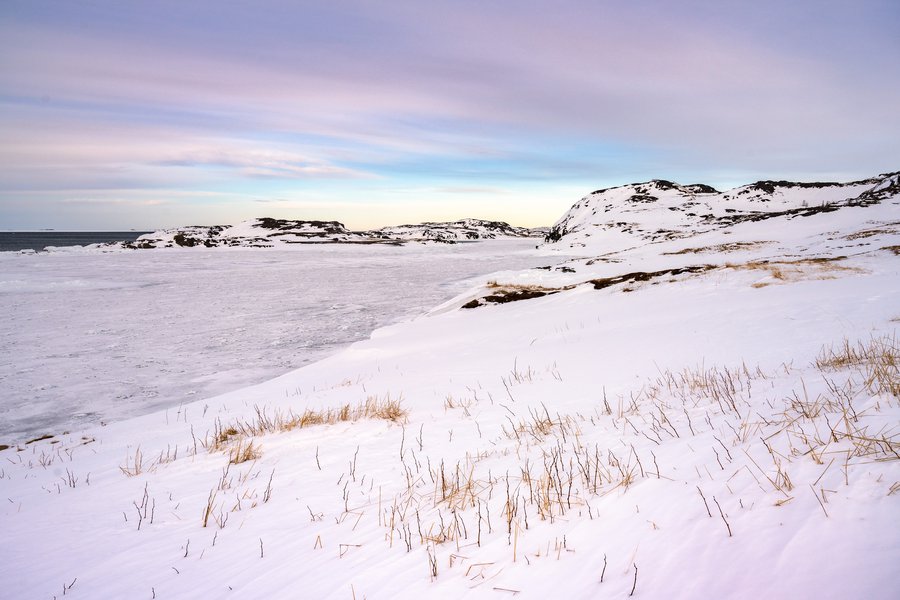The past year has modulated our lives small tones at a time and then sudden key changes, so much that it has been hard to write with clear distinctions about each place we are, and how we are in that place. But this week, we are all thinking much about the milestone of a year since the shifting starting and in that longer expanse, it is easier to see a then and a now. We have lived in four places in few-month groupings this year, and some of them I have not had a chance to share here. Who we were in each, it is hard to recall and yet, the starting point is clear and thinking back on it, I can see in the air around that distance.

It is Friday, March 12th, 2020. Our flight to Canada has shifted back a day and we are apoplectic if we should travel, uncertainty not only in the air, but inside my lungs and shallow breaths I take of anxiety. We eat pasta and fish in our neighborhood home, AlMar, and wonder if the tables are too close. Our neighbors, sitting across the room, send Walker a glass of wine, and we all talk about this being over before long. We call the Inn again, and ask if we should still come, and they say their fires are on for us as no regulations have changed.
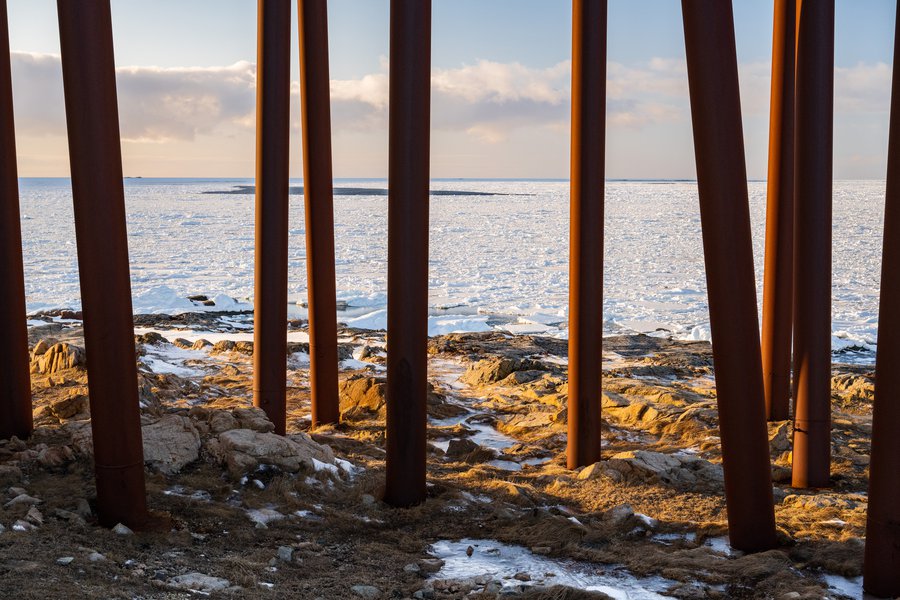
No one knows yet the power of the virus or the prevalence, so we leave Saturday morning from a silent LaGuardia. Three flights later, one so loud it feels the metal screws holding the plane together will vibrate out, we land in Gander, a small town in Newfoundland. The rental car attendant tells us we may be leaving again in the morning, and we have a tossing night of sleep but drive to the lineup for the ferry, breathing the empty, clear air.
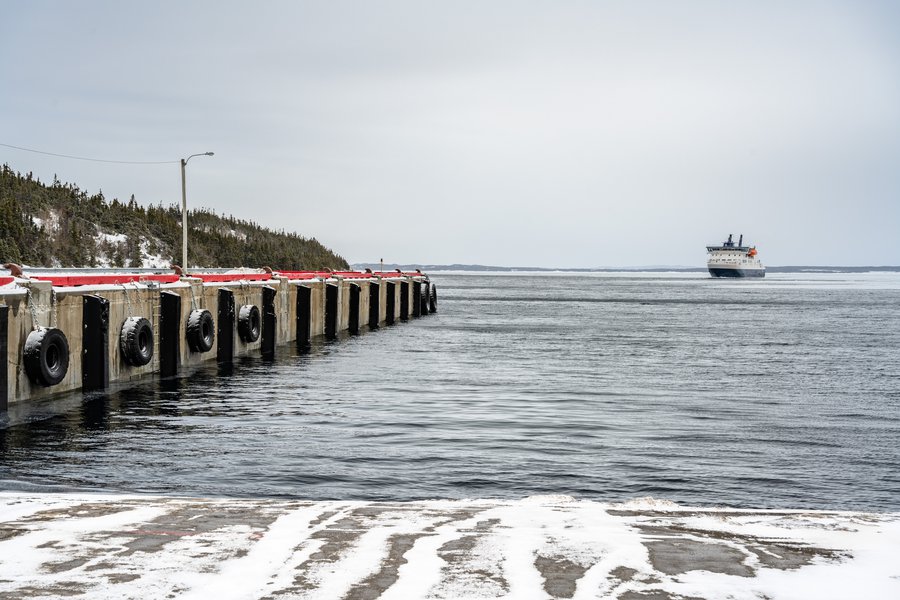
We are bound for our second time on Fogo Island, a place so fully itself and present, that it captivated us in the summer. We're looking forward to the pack ice we've heard of, floating ice sheets broken off glaciers that come into harbor in the late winter. But the ice has us beat, because we are the first car in line for the ferry, and long after we are due to board, a truck drives by and the driver rolls down his window to say "waiting on the icebreaker from Carmanville" with no further detail.

An hour or so later, I walk to the office building in the ferry lot, hoping for a restroom. In the entry, a town bulletin board is collaged with local ads, and a petite woman stands reading them. She says hello, introduces herself as Helen, and then we talk for over an hour, so long that Walker comes searching for me, wondering if I've been locked in the restroom accidentally. I hear about her life growing up on Fogo and their weekend plans on the island in their summer home that they have lovingly restored. When the icebreaker arrives and we finally make it on the ferry, Helen and her husband and Walker and I sit together as the ferry rasps through thick ice sheets.

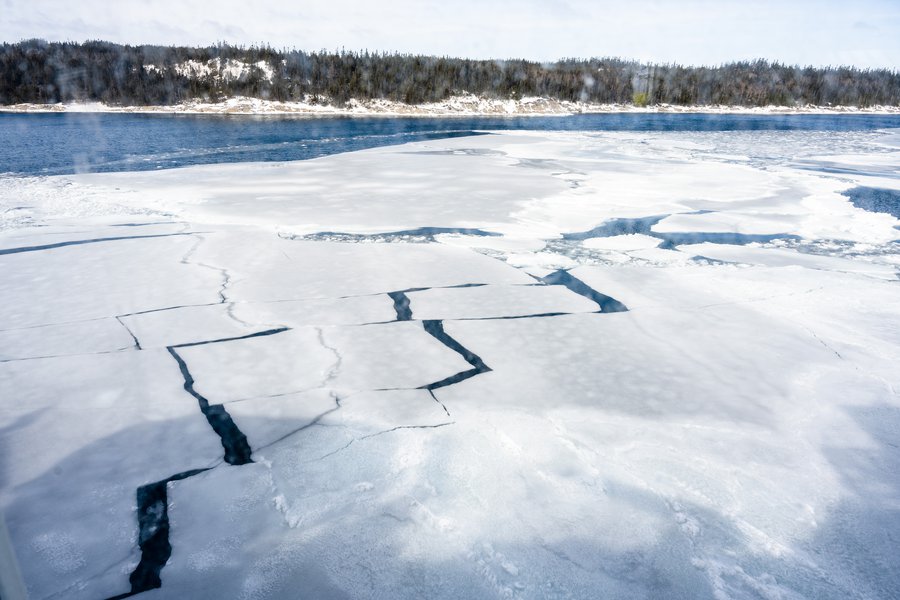

They buy me a gluten free energy bar from the vending machine when I don't have the right currency. Helen, friends with the captain, sneaks us up near the top of the ferry and we watch for seals and polar bears (but none). When we arrive in harbor, Helen insists we stop by their home in town while we're on the island, and we promise not to leave before doing so. She only tells us it's yellow and on the harbor, no address. "You can't miss it!"

We arrive at Fogo Island Inn, and for the next days, are cozied in warmth and welcome. We sit listening late to the lilting ballads of an island gentleman named Aaron Cobb, and he shows us photos of his father, tells stories of the ice and the bears.

We snowshoe to a local cabin, where there is jam tart and local cheese placed out for us by islanders.
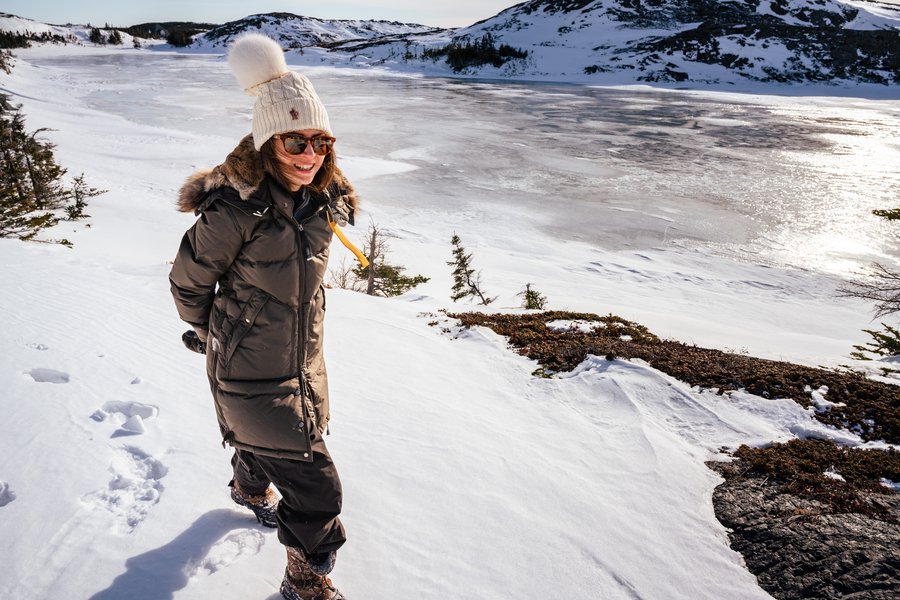
Seals sun on the ice, then disappear.

We hike into the interior on the day before St. Patrick's, a big local holiday, and meet our guide's family at their cabin.
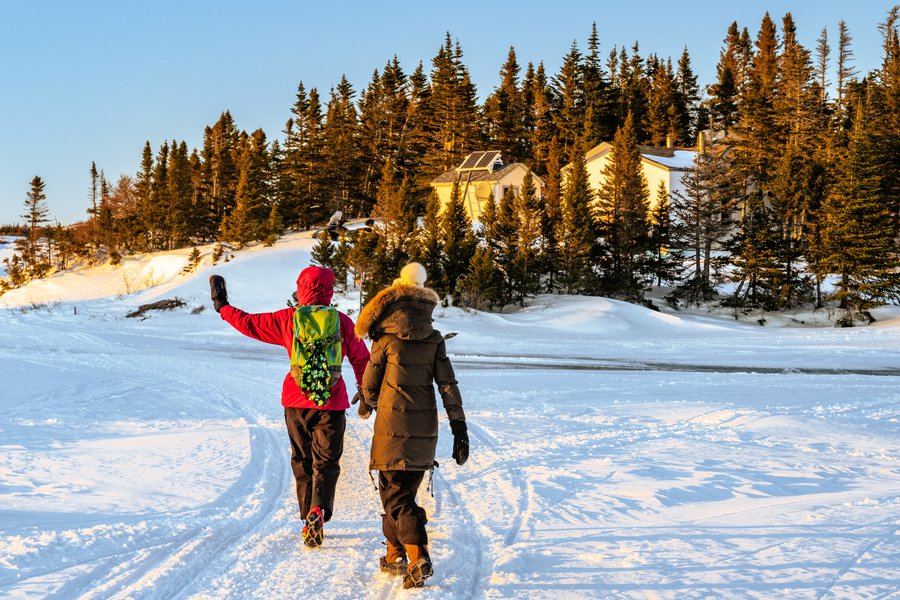

The sunset is pink across the ice.

At night, the Inn loads up our stove with wood and even its crackle feels silent under the winter winds on the waves below. All the other guests and us, very few in the end, talk about when to leave, where to go. After every meal, we stand talking long after our plates have cleared. Ice comes in so thick it feels the harbor will pile up, and while we sleep, slips away and we wake to bright blue waters. A sea change.

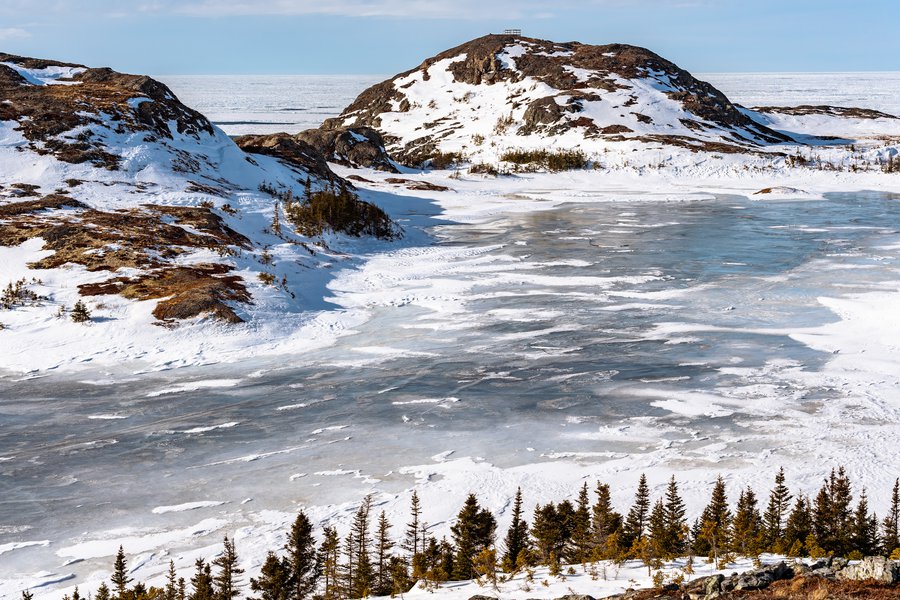
No one owns a mask and no one knows we probably should not be on the island, but I have panicked moments of fear that I may have brought something to this community nonetheless.
On our last full day, we drive to the harbor of the town of Joe Batt's Arm and find the yellow house. The door swings open with warmth, and Helen has prepared a huge gluten free feast for us: local cheeses, crackers, fruits and snacks. We have lived nearly 10 years in a city, and never seen inside almost any of our colleague's homes. We have met Helen and Brian days before and here we are, their dogs nuzzling our hands for treats. Hours later, we are saying goodbyes and I compliment Helen's lovely knit slippers. I ask if they are made locally, and she says her friend back in St. John's has made them. And then: she finds her other pair and insists I take them. I'm tearing up even now thinking of the generosity. I am smitten. They are lovely and perfect.
The Inn washes and hangs them on the towel rack, and from that moment, they have barely left my feet the last year.
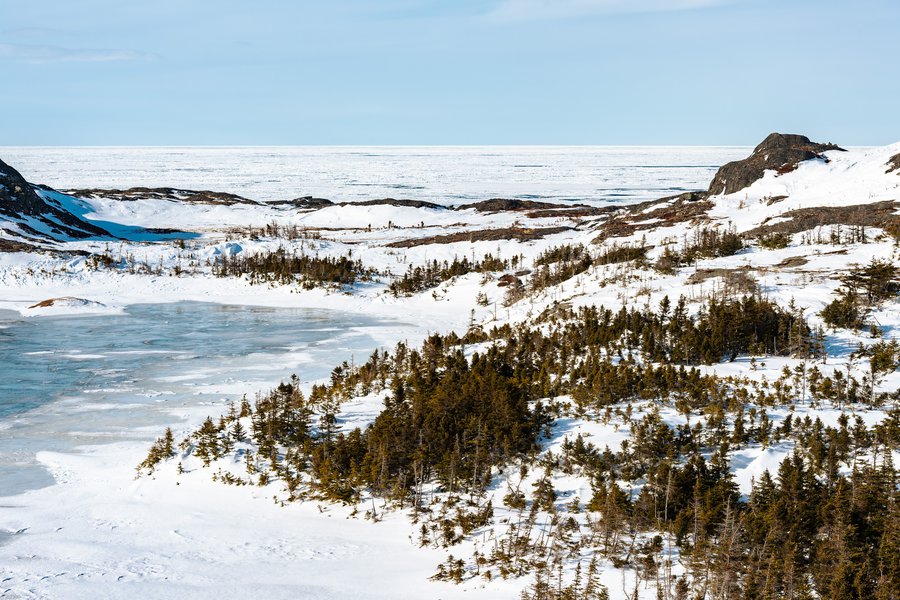
We reroute back to Minnesota, as the border has closed, and this is closer and safer. We stay with Walker's very generous parents. We watch lakes unfreeze and loon cries rise over the flat land. The prairie turns green then softer, and then fall yellows. We think about the city and our home there every day, and think about land and what being apart from soil has meant. We decide it's time to continue our break from the city, for now. We think about places with community, where we have roots to the air and we choose Maine.
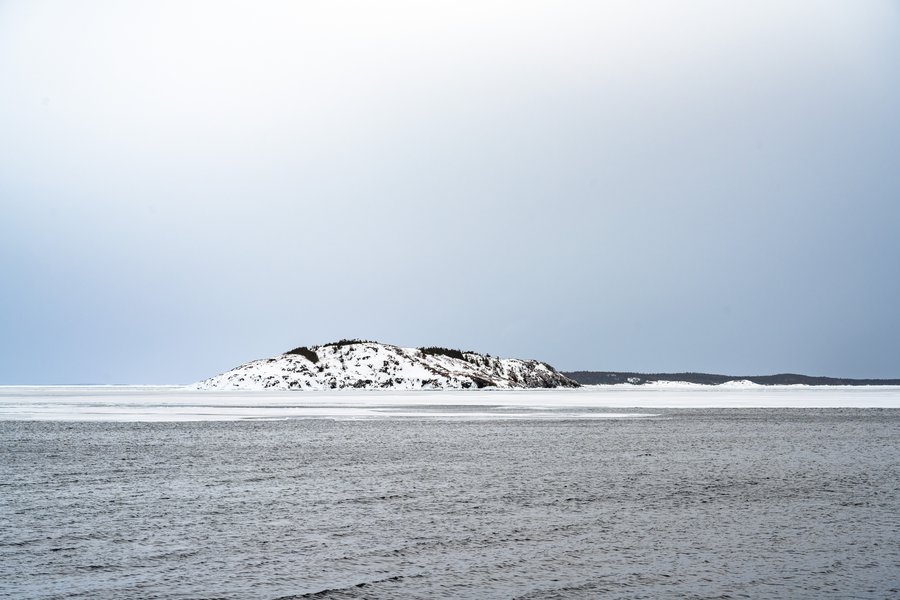
Months here, and it feels like where we should be.
My feet have lived in some very cold places this year, so cold I have carried a space heater with me, filled countless water bottles, spent over $100 on hand warmers, and once contemplated crawling in the just-warmed clothes dryer (of course not!). I've worn Helen's slippers thin, their tangibility making them my most precious piece of clothing.
This morning, rinsing the coffee mug in the sink, I look down over the harbor in this small cove in Maine. It's a blue day: sky and ocean smiling together, and a thin school of ice shards groups together there. I watch it move throughout the morning, unsticking itself and always lifting up against the waves. They are smaller now, the winds dying in the arriving spring.

I think of an island off an island, as far east as you can go on this continent, and the shapes we have all shifted since.
